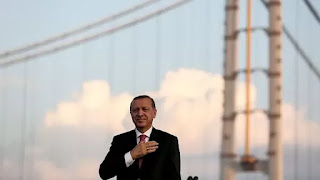From humble beginnings, Recep Tayyip Erdogan has grown into a political giant, leading Turkey for 20 years and reshaping his country more than any leader since Mustafa Kemal Ataturk, the revered father of the modern republic.
Now he faces one of the biggest tests of his political career, as Turkey reels from its most devastating earthquake since 1999.
He survived a coup attempt in 2016, but his chances of extending his rule into a third decade may now hinge on his handling of the quake that has hit 10 provinces in the south-east.
Rampant inflation and a cost-of-living crisis has already hit his poll ratings and, as May elections approach, an emboldened opposition has accused him of failing to prepare for Monday's disaster in a country prone to powerful earthquakes.
For a pugnacious leader who built a proud record on modernising and developing Turkey, the loss of so many lives in the rubble of thousands of buildings represents a real threat. Opposition leaders were quick to visit the region well before the president arrived.
First as prime minister from 2003 and then as directly elected president since 2014, Recep Tayyip Erdogan has flexed Turkey's muscles as a regional power, championed Islamist causes and been quick to outmanoeuvre domestic opposition.
Although he is the head of a Nato country, he has positioned himself as a broker in Russia's war in Ukraine and kept Sweden and Finland waiting in their bids to join the Western defensive alliance. His muscular diplomacy has riled allies in Europe and beyond.
While many Turks are looking for a future without him, President Erdogan is a proven election winner and will not give up power lightly. He has already sought to prevent a leading rival, the mayor of Istanbul, from running.
He, more than anyone, knew the risk of defeat at the hands of a popular Istanbul mayor, because that was the role in which he built his powerbase in the 1990s.
Rise to power
Born in February 1954, Recep Tayyip Erdogan grew up the son of a coastguard, on Turkey's Black Sea coast. When he was 13, his father decided to move to Istanbul, hoping to give his five children a better upbringing.
The young Erdogan sold lemonade and sesame buns to earn extra cash. He attended an Islamic school before obtaining a degree in management from Istanbul's Marmara University - and playing professional football.
In the 1970s and 80s, he was active in Islamist circles, joining Necmettin Erbakan's pro-Islamic Welfare Party. As the party grew in popularity in the 1990s, Mr Erdogan was elected as its candidate for mayor of Istanbul in 1994 and ran the city for the next four years.
But his term came to an end when he was convicted of inciting racial hatred for publicly reading a nationalist poem that included the lines: "The mosques are our barracks, the domes our helmets, the minarets our bayonets and the faithful our soldiers."
After serving four months in jail, he returned to politics. But his party had been banned for violating the strict secular principles of the modern Turkish state.
In August 2001, he founded an new, Islamist-rooted party with ally Abdullah Gul. In 2002, the AKP won a majority in parliamentary elections and the following year, Mr Erdogan was appointed prime minister. He remains chairman of the AKP or Justice and Development Party to this day.
First decade in power
From 2003, he spent three terms as prime minister, presiding over a period of steady economic growth and winning praise internationally as a reformer. The country's middle class expanded and millions were taken out of poverty, as Mr Erdogan prioritised giant infrastructure projects to modernise Turkey.
But critics warned he was becoming increasingly autocratic.
By 2013, protesters took to the streets, partly because of his government's plans to transform a much-loved park in the centre of Istanbul, but also in a challenge to more authoritarian rule. The prime minister condemned the protesters as "capulcu" (riff-raff), and neighbourhoods would clang pots and pans at nine o'clock every night in a spirit of defiance. Allegations of corruption ensnared the sons of three cabinet allies.
The Gezi Park protests marked a turning point in his rule. To his detractors, he was acting more like a sultan from the Ottoman Empire than a democrat.
Mr Erdogan also fell out with a US-based Islamic scholar called Fethullah Gulen, whose social and cultural movement had helped him to victory in three consecutive elections and had been active in removing the military from politics. It was a feud that would have dramatic repercussions for Turkish society.
Muslim revival
After a decade of his rule, Mr Erdogan's party also moved to lift a ban on women wearing headscarves in public services that was introduced after a military coup in 1980. The ban was eventually lifted for women in the police, military and judiciary.
Critics complained he had chipped away at the pillars of Mustafa Kemal Ataturk's secular republic. While religious himself, Mr Erdogan always denied wanting to impose Islamic values, insisting he supported the rights of Turks to express their religion more openly.
